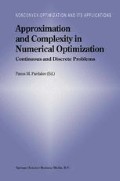Abstract
We study a new parameterization algorithm for the P-matrix restriction of the linear complementarity problem. This parameterization can be considered similar to a path-following penalty method, and introduces to this class of algorithms a primal-dual symmetry similar to that seen in the highly successful path-following logarithmic barrier methods. The trajectory associated with the parameterization is distinguished by a naturally defined starting point and by a piecewise characterization as a fractional polynomial function of a single parameter. The trajectory can be followed exactly using root isolation and a simplex-like pivoting scheme. Convergence is guaranteed for a weakly-regular subclass of P-matrix LCPs. We show that under a weakly-regular and sign-invariant distribution for the input matrices and vectors, the average number of pieces in the trajectory is O(n 2), where n is the dimension of the problem space, and hence that the path-following algorithm has average-case polynomial running time.
Access this chapter
Tax calculation will be finalised at checkout
Purchases are for personal use only
Preview
Unable to display preview. Download preview PDF.
References
I. Adler, R. M. Karp, and R. Shamir (1987), “A Simplex Variant Solving an m x d Linear Program in o(min(m2, d2)) Expected Number of Pivot Steps,” Journal of Complexity, 3, 372–387.
I. Adler and N. Megiddo (1985), “A Simplex Algorithm whose Average Number of Steps is Bounded Between Two Quadratic Functions of the Small Dimension,” Journal of Assoc. Computing Machinery, 32, 871–895.
M. Anitescu, G. Lesaja, and F. Potra (1995), “Equivalence between Various Formulations of the Linear Complementarity Problem,” Technical Report 71, Department of Mathematics, University of Iowa.
K.H. Borgwardt. (1987), The Simplex Method: A Probabilistic Approach, Springer-Verlag, Berlin.
G.E. Collins and R. Loos (1983), “Real Zeros of Polynomials,” in Computer Algebra, G.E. Collins and R. Loos, eds., Springer-Verlag, Wien, 84–94.
R. Cottle, J.-S. Pang, and R. Stone. (1992), The Linear Complementarity Problem, Academic Press, Inc.
B.C. Eaves (1971), “The Linear Complementarity Problem,” Management Science, 17, 612–634.
M. Kojima, N. Megiddo, and S. Mizuno (1993), “A General Framework of Continuation Methods for Complementary Problems,” Mathematics of Operations Research, 18 (4), 945–963.
M. Kojima, N. Megiddo, T. Noma, and A. Yoshise. (1991), Lecture Notes in Computer Science: A Unified Approach to Interior Point Algorithms for Linear Complementarity Problem, Springer-Verlag, New York, NY.
D. Luenberger. (1973), Introduction to Linear and Nonlinear Programming, Addison-Wesley, Menlo Park, CA.
B. Mishra. (1993), Algorithmic Algebra (Texts and Monographs in Computer Science), Springer-Verlag, New York, NY.
J. Moré (1974), “Coercivity Conditions in Nonlinear Complementary Problems,” SIAM Review, 16, 1–16.
K. Murty. (1983), Linear Programming, John Wiley and Sons.
P.M. Pardalos, Y. Ye, C.-G. Han, and J. Kalinski (1993), “Solution of P-matrix Linear Complementarity Problems using a Potential Reduction Algorithm,” SIAM Journal on Matrix Analysis and Applications, 14, No. 4, 1048–1060.
S. Smale (1983), “On the Average Speed of the Simplex Method of Linear Programming,” Mathematical Programming, 27, 241–262.
M. J. Todd (1986), “Polynomial Expected Behavior of a Pivoting Algorithm for Linear Complementarity and Linear Programming Problems,” Mathematical Programming, 35, 173–192.
Y. Ye and P. M. Pardalos (1991), “A Class of Linear Complementarity Problems Solvable in Polynomial Time,” Linear Algebra and its Applications, 152, 3–17.
Author information
Authors and Affiliations
Editor information
Editors and Affiliations
Rights and permissions
Copyright information
© 2000 Springer Science+Business Media Dordrecht
About this chapter
Cite this chapter
Verma, S., Beling, P.A., Adler, I. (2000). A New Parameterization Algorithm for the Linear Complementarity Problem. In: Pardalos, P.M. (eds) Approximation and Complexity in Numerical Optimization. Nonconvex Optimization and Its Applications, vol 42. Springer, Boston, MA. https://doi.org/10.1007/978-1-4757-3145-3_31
Download citation
DOI: https://doi.org/10.1007/978-1-4757-3145-3_31
Publisher Name: Springer, Boston, MA
Print ISBN: 978-1-4419-4829-8
Online ISBN: 978-1-4757-3145-3
eBook Packages: Springer Book Archive

